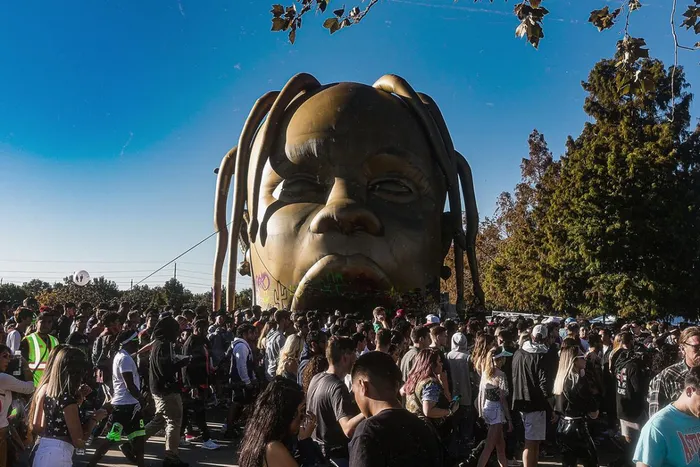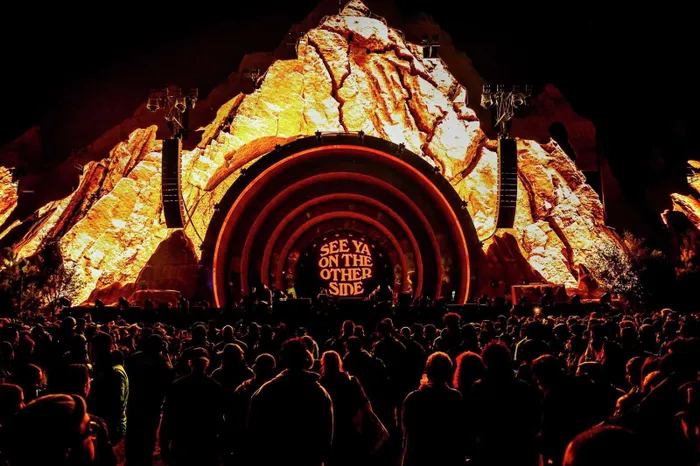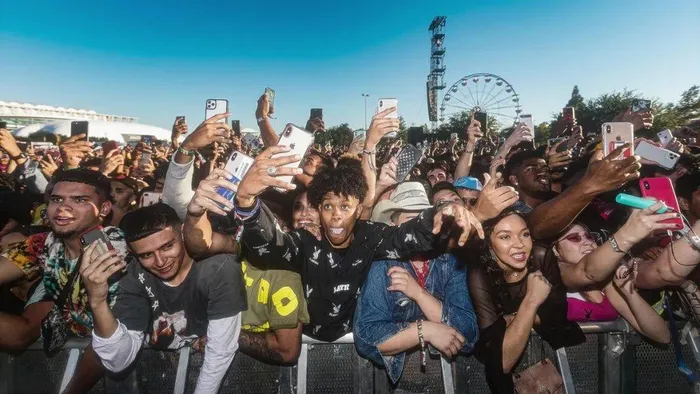
Astroworld is created by rapper Travis Scott and was marketed as a world of wonder, a playground of psychedelic visuals, thrilling rides and high-energy music.
Image: X/@decider
I’ve been waiting years for a proper documentary on the Astroworld tragedy, one that strips away the headlines, the hashtags and the hype to finally give a voice to the people caught in the chaos.
It’s been nearly five years since the deadly incident yet only now, through Netflix’s "'Trainwreck: The Astroworld Tragedy" are we truly beginning to grasp the horror of the music festival.
You can practically feel the breathlessness, the panic, the suffocation that engulfed the crowd that night. It’s a grim reminder of what happens when chaos meets carelessness and no one takes responsibility.
Astroworld was supposed to be a celebration. Born out of Travis Scott’s childhood nostalgia for the defunct Six Flags Astroworld amusement park in Houston,Texas, the festival was marketed as a surreal wonderland of music, lights and striking visuals.
The rapper positioned himself not just as a performer but as the creator of a musical universe.
Fans came from across the country, some after months of isolation during the Covid-19 pandemic, all seeking release, connection and excitement. What they found instead was terror.
Ten people, many of them barely out of their teens, lost their lives in a deadly crowd surge during Scott’s headline set.
Thousands more were left injured, traumatised or forever changed. The documentary slowly reveals the layers of mismanagement, negligence and sheer recklessness that turned a concert into a catastrophe.

A concertgoer described the Astroworld experience as 'demonic,' questioning the eerie atmosphere and subluminal messages.
Image: X/@geegucks
The most powerful parts of the documentary come from those who were there, including a newly qualified nurse hoping to celebrate her achievement.
There was also a paramedic who was proud to be working at such a major event, groups of friends excited to reunite after lockdowns and ordinary people, full of joy and anticipation.
But they were all suddenly thrown into an environment where survival became the only goal.
From the get-go, the event was disorganised. Jackson Bush, who was hired as security just hours before gates opened, admits he had no clue what to do or where to go.
He wasn’t alone. The security teams were overwhelmed before the music even started. Entry points were chaotic, with ticketless fans scaling fences and flooding the grounds. By nightfall, the energy had shifted and not in a good way.
Astroworld is tied to Scott’s identity as a high-octane performer who thrives off mayhem. He’s known for encouraging mosh pits, wild dancing and “raging” all part of the Scott experience.
That reputation may fuel his popularity among younger fans but in an environment with minimal control and poor emergency planning, it’s a recipe for disaster.
As the crowd thickened and people began to lose control of their bodies, panic set in. What’s truly heartbreaking is how many attendees said they knew something was wrong. They screamed. They cried.
They waved at camera towers, climbed speakers, ran to security. But nothing stopped the music. Attendees described it as feeling like a waking nightmare, a sleep paralysis where your voice doesn’t matter.
Even more chilling are the moments in the documentary where fans describe the eerie sounds and visuals during Scott’s set.
Some recall an unsettling ad-lib that echoed across the crowd as people were gasping for air. Others speak of a “dark energy,” a spiritual heaviness that made it feel like they were leaving their bodies.
These descriptions have fuelled conspiracy theories, with some online pointing to hidden symbols, demonic imagery and ritualistic undertones.
While the film doesn’t lean into those claims, it does acknowledge how many people left feeling deeply disturbed on more than just a physical level.
The real villain here, however, isn’t mysticism but rather it’s corporate negligence. Paul Wertheimer, a crowd safety expert, outlines how Live Nation’s internal protocol gave just two individuals the authority to stop the show.
Davidson, another voice in the documentary, sums it up perfectly: “The common denominator in what happened at Astroworld was a failure to speak truth to power.”
Houston Police were reportedly aware of the escalating crisis by 9:30pm yet couldn’t locate a Live Nation manager to intervene.
And where was Scott in all of this? Still performing, seemingly disconnected from the mayhem unfolding in front of him. Yes, there’s debate about what he could or couldn’t see from the stage.

'Trainwreck: The Astroworld Tragedy' unpacks the horrific events of the 2021 festival.
Image: X/@consequence
But when fans are climbing onto equipment begging for help and the music keeps playing, it feels like more than just a miscommunication.
The apology that followed? Wooden, rehearsed and hollow. No public accountability, no real reckoning. Just a carefully worded statement and then business as usual.
As Scott prepares to perform in South Africa later this year, this documentary feels particularly relevant. It’s not just a story about one night gone wrong.
It’s a reminder of how blindly we can place trust in fame. How easily we can excuse bad behaviour when it’s wrapped in designer clothes, flashy production and catchy beats.
It raises difficult questions about celebrity culture, crowd safety and who gets to decide when something has gone too far.
If Astroworld was meant to be an escape, it turned out to be a warning. And we’d be foolish not to pay attention.
Related Topics: